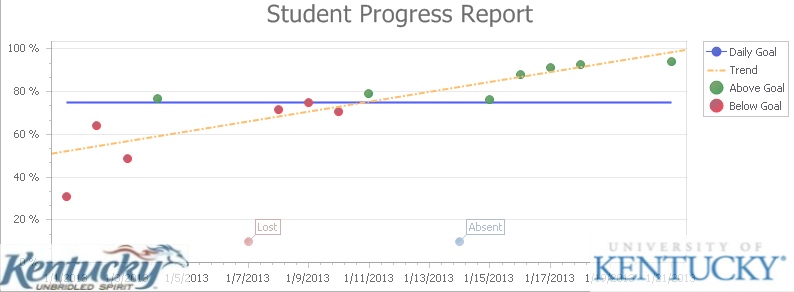Working to make a difference for children
who display challenging behavior
Behavior Interventions-
Targeted
The universal school experience however may not be enough for all
students. By definition, students who are at-risk for school failure,
or display a chronic pattern of inappropriate behavior do not respond
to universal interventions (5% to 15%). An indicator that more specially
designed behavior supports are required is when some students continue
to engage in inappropriate behavior despite a sound and clear school-wide
discipline program. Group interventions are needed for these students
who are at-risk for school failure or developing more chronic behavior
patterns (Effective Behavior
Support)
The Teacher's Encyclopedia of Behavior Management
Dr. Randall Sprick graciously has given his permission to post two problem behaviors (aggression-verbal and/or physical and chaos- classroom out of control) and all plans listed within these two chapters. We sincerely thank him for providing this resource to the teachers of Kentucky so that they may effectively serve students with challenging behaviors.
PBIS World-Tier 2 Resources
PBIS World is a website containing links to hundreds of interventions, supports, resources, and data collection tools, all of which are organized into the tier 1 through 3 framework. It is designed to help guide users through the PBIS implementation process, starting with behavior identification and offering suggestions for interventions and data collection tools.
Very popular series of book addressing the tough to teach student. Resources for teaching social skills are also a part of this series by William Jenson, Ph.D. et al.
Learning Disabilities and Challenging Behaviors: A Guide to Intervention and Classroom Management
The Building Blocks model is practical, supported by research, and easy to implement. It identifies ten areas important to school success (the building blocks), divided into three levels: (a) the foundational level includes attention and impulse control, emotion and behavior, self-esteem, and learning environment blocks; (b) the symbolic processing and (c) memory level contains the visual, auditory, and motor skills blocks the conceptual level comprises using strategies and thinking with language and images. By Nancy Mather, Ph.D., & Sam Goldstein, Ph.D.
Facilitator's
Guide: Positive Behavior Support
The Facilitator's Guide on Positive Behavioral Support provides a step-by-step process to guide teams through assessment, planning, intervention, and evaluation. The goal is to assist educators, family members, and other support providers to work collaboratively to develop an understanding of circumstances affecting a student's behavior and to design interventions that lead to positive life-style changes. Written by staff of the Positive Behavioral Support Project. This project is part of the Department of Child and Family Studies of the Louis de la Parte Florida Mental Health Institute at the University of South Florida, and is funded by the State of Florida
"In an effort to provide assistance and address these concerns in a comprehensive manner, the Kentucky Department of Education (KDE) is sending this information to school superintendents, directors of special education, principals, and parent resource centers to help promote effective policies for implementing appropriate uses of seclusionary time-out for all students. I encourage you to distribute this information to all staff that work with these students and to the parents of these students so that everyone involved can work cooperatively to ensure the student's educational success. " (From the letter from KDE regarding the use of seclusionary time-out)
Understanding
Behavior: An Interactive Tutorial
To deal effectively with students who exhibit challenging behaviors, it is important to approach such problems from a research-validated theoretical perspective. Understanding Behavior: An Interactive Tutorial provides a basic introduction to the behavioral model. By understanding and applying the behavioral model, you will increase the likelihood of intervening successfully with problem behaviors.
Social Skill Resources have been located and organized in this section. Links to Sopris West, Thinking Publications, Boys Town, and Research Press Web sites are provided to make it easy for you to locate the social skills program of your choice.
This area of the Behavior Home Page provides functional behavioral assessment resources.
Resources that address student anger management have been organized in this section of the Behavior Home Page.
Resources that address bullying have been organized in this section of the Behavior Home Page.
Resources that address peer mediation have been organized in this section of the Behavior Home Page.
